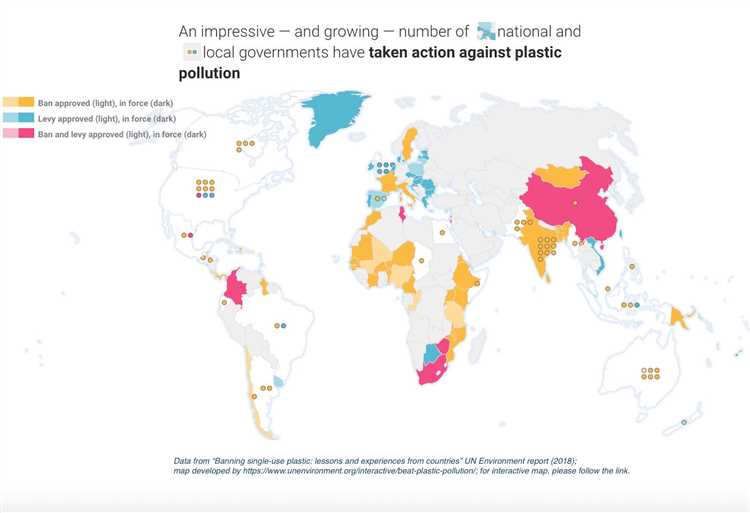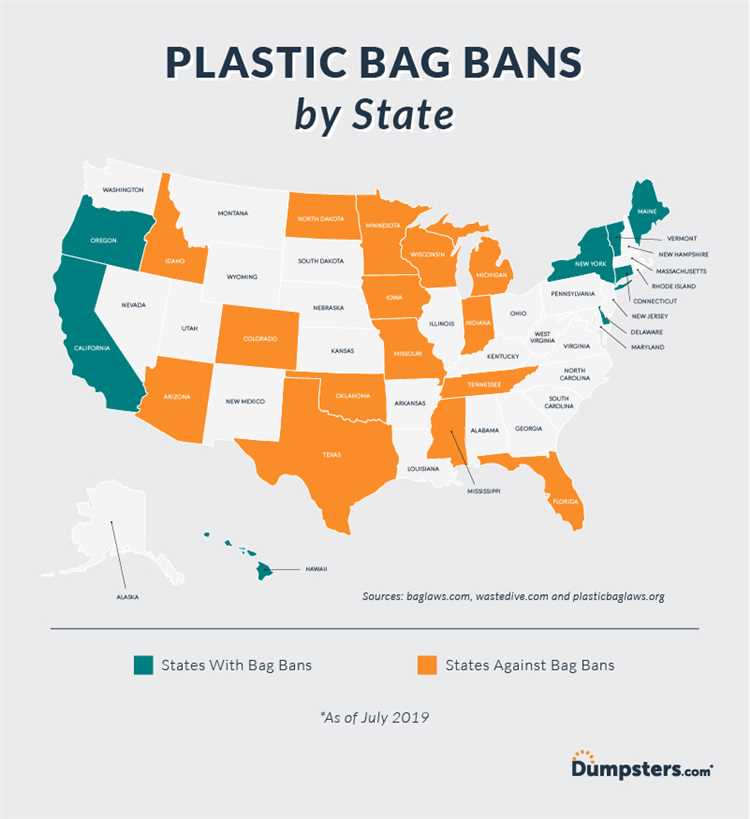
In recent years, there has been a growing global movement to reduce plastic waste and protect the environment. Many cities around the world have implemented plastic bans as a part of their efforts to combat this issue. These bans aim to reduce the use of single-use plastics, such as bags, straws, and packaging, which are major contributors to pollution and harm marine life.
One of the frontrunners in the fight against plastic waste is San Francisco, California. In 2007, the city became the first in the United States to ban plastic bags in large supermarkets and pharmacies. This ban was later expanded to include all retail stores in 2012. San Francisco’s efforts have proven successful in reducing plastic waste, and the city has become a model for other municipalities looking to implement similar bans.
Another city leading the way in plastic bans is Mumbai, India. With a population of over 18 million people, Mumbai generates a significant amount of plastic waste. In 2018, the city implemented a ban on single-use plastics, including bags, cups, and cutlery. The ban has been strictly enforced, with heavy fines for violators. Mumbai’s plastic ban has had a positive impact on the city’s cleanliness and has inspired other Indian cities to follow suit.
Europe is also taking significant steps towards reducing plastic waste. In 2015, Paris, France, implemented a ban on plastic bags, with the goal of completely eliminating them by 2020. The ban has been successful, with a significant reduction in the use of plastic bags. Other European cities, including Barcelona, Spain, and Amsterdam, Netherlands, have also implemented plastic bans and are actively working towards becoming plastic-free cities.
The movement against plastic waste is not limited to large cities. Many smaller cities and towns around the world are also implementing plastic bans. For example, the coastal town of Bundanoon in Australia became the first town in the country to ban the sale of bottled water in 2009. This decision was made to reduce plastic waste and encourage the use of reusable water bottles. Other towns, such as Penang in Malaysia and Capannori in Italy, have also implemented plastic bans with the aim of creating a cleaner and more sustainable future.
Overall, cities around the world are recognizing the need to take action against plastic waste. Through the implementation of plastic bans, these cities are leading the way in creating a more sustainable future and protecting the planet for generations to come.
- Environmental Impact of Plastic
- 1. Pollution of Land and Water
- 2. Greenhouse Gas Emissions
- 3. Threat to Wildlife
- Implementing Plastic Bans
- Cities Leading the Way
- 1. San Francisco, California, United States
- 2. Mumbai, Maharashtra, India
- Challenges and Benefits
- Challenges
- Benefits
- Global Outlook
- Question-answer:
- What is a plastic ban?
- Which countries have implemented plastic bans?
- What are the benefits of plastic bans?
- Are plastic bans effective in reducing plastic waste?
- What are some challenges in implementing plastic bans?
Environmental Impact of Plastic
Plastic pollution has become a global environmental crisis, with significant negative impacts on our planet. From production to disposal, plastic generates a range of environmental problems, including:
1. Pollution of Land and Water
Plastic waste overwhelms our landfills, causing them to reach their capacity and polluting the surrounding soil. Additionally, plastics that end up in rivers and oceans pose a serious threat to marine life. Marine animals can mistake plastic debris for food or become entangled in it, leading to injury or death.
2. Greenhouse Gas Emissions

The production and incineration of plastics contribute to greenhouse gas emissions, exacerbating climate change. The extraction, refinement, and transportation of fossil fuels, which are used to produce plastic, release significant amounts of carbon dioxide and other greenhouse gases into the atmosphere.
| Environmental Impact | Solutions |
|---|---|
| Pollution of Land and Water | Reducing single-use plastics, promoting recycling and waste management systems |
| Greenhouse Gas Emissions | Transitioning to renewable energy sources, reducing plastic production |
| Threat to Wildlife | Implementing stricter regulations, raising awareness about the impact of plastic on wildlife |
3. Threat to Wildlife
Plastic waste poses a significant threat to wildlife, both on land and in the ocean. Marine animals, such as turtles, seabirds, and whales, can ingest or become entangled in plastic debris, leading to injury, suffocation, or starvation. Land animals, including birds and mammals, can also be harmed by ingesting smaller plastic fragments or getting trapped in larger plastic items.
To address these environmental impacts, cities around the world are implementing plastic bans and adopting sustainable practices. By reducing single-use plastics, promoting recycling and waste management systems, transitioning to renewable energy sources, and implementing stricter regulations, we can mitigate the environmental impact of plastic and work towards a cleaner, healthier planet.
Implementing Plastic Bans
Implementing plastic bans is a complex process that requires careful planning and coordination. The first step is usually the passage of legislation or the creation of local ordinances that ban or restrict the use of plastic items such as bags, straws, and single-use containers.
Strong leadership and public support are essential for the successful implementation of plastic bans. City officials and community leaders must work together to create awareness campaigns and educate residents about the importance of reducing plastic waste. This can be done through public forums, workshops, and the distribution of informational materials.
Another crucial aspect of implementing plastic bans is providing viable alternatives to plastic products. This can involve finding sustainable materials or promoting the use of reusable items. Cities can also encourage the development of local businesses that produce eco-friendly alternatives to plastic, creating a positive economic impact on the community.
Enforcement is a key factor in the effectiveness of plastic bans. City officials must establish mechanisms to monitor compliance with the ban and enforce penalties for non-compliance. This can involve inspections, fines, or other punitive measures. It is important for the community to understand the consequences of not following the ban in order to ensure its success.
Regular evaluation and adjustment of the ban’s implementation are crucial for its long-term success. City officials should monitor the impact of the ban on plastic waste reduction and address any challenges that arise. This can involve making adjustments to the scope of the ban or seeking input from stakeholders to improve its effectiveness.
Implementing plastic bans is an ongoing process that requires collaboration and dedication from all stakeholders involved. By making a concerted effort to reduce plastic waste, cities can contribute to a more sustainable future while creating healthier and cleaner environments for their residents.
Cities Leading the Way

Plastic bans are becoming more and more common across the globe, with cities taking the lead in reducing plastic waste and promoting sustainable alternatives. These cities are setting an example for others to follow, implementing innovative solutions and inspiring change.
1. San Francisco, California, United States
San Francisco was one of the first cities in the world to ban plastic bags, back in 2007. Since then, the city has continued to lead the way in environmental initiatives, including banning plastic straws and requiring that all food packaging be compostable or recyclable. San Francisco’s commitment to sustainability makes it a model for other cities looking to reduce plastic waste.
2. Mumbai, Maharashtra, India
Mumbai, one of the world’s largest cities, has taken steps to combat plastic pollution by banning a wide range of single-use plastics, including bags, cutlery, and bottles. The city has also implemented strict penalties for violations of the ban, encouraging businesses and individuals to find more sustainable alternatives. Mumbai’s efforts demonstrate that even in densely populated urban areas, significant progress can be made in reducing plastic waste.
Other cities around the world, such as Vancouver, Canada, and Melbourne, Australia, are also making significant strides in reducing plastic waste. These cities have implemented restrictions on single-use plastics and are actively promoting reusable alternatives. Their efforts show that with government support and public engagement, it is possible to create a more sustainable future.
Conclusion:
Cities leading the way in plastic bans are showing the world that sustainable alternatives are not only possible but necessary. By implementing innovative solutions, these cities are inspiring change and encouraging other cities to follow suit. The global movement towards reducing plastic waste is gaining momentum, and with the continued efforts of cities and individuals, plastic bans will become more common worldwide.
Challenges and Benefits
Implementing a plastic ban in cities presents various challenges and benefits. While it may require significant effort and resources to enforce and educate the public, the long-term benefits of reduced plastic waste make it a worthwhile endeavor.
Challenges
One of the main challenges of a plastic ban is changing people’s behavior and mindset. Plastic has become an integral part of our daily lives, and convincing individuals to switch to alternative materials can be difficult. There may be resistance from both businesses and consumers who are accustomed to the convenience and affordability of plastic products.
Another challenge is finding suitable alternatives to plastic. While there are many eco-friendly alternatives available, not all of them are as easily accessible or affordable. This can pose a barrier for businesses and individuals who rely on plastic for various purposes.
Benefits
Despite the challenges, implementing a plastic ban can have numerous benefits. The most obvious benefit is reducing plastic waste and its detrimental effects on the environment. Plastic waste often ends up in landfills, oceans, and other natural habitats, causing harm to wildlife and ecosystems.
Additionally, a plastic ban can promote innovation and the development of sustainable alternatives. By encouraging businesses and individuals to find and use alternative materials, cities can foster a culture of sustainability and eco-consciousness.
Furthermore, a plastic ban can have positive economic impacts. It can create new job opportunities in the manufacturing and production of alternative materials. It can also drive the demand for eco-friendly products, benefiting businesses that offer sustainable alternatives.
In conclusion, while implementing a plastic ban comes with its challenges, the benefits of reduced plastic waste, increased sustainability, and positive economic impacts make it a necessary and worthwhile undertaking for cities around the world.
Global Outlook
The global outlook for cities with plastic bans is rapidly changing as more and more countries recognize the need to reduce plastic waste. With growing concerns about the impact of plastic on the environment, countries around the world are implementing policies and regulations to restrict the use of single-use plastics.
Many cities and towns have already implemented plastic bans or restrictions on specific items such as plastic bags, straws, and bottles. For example, in 2020, the European Union banned a range of single-use plastics, including cotton bud sticks, cutlery, plates, straws, and stirrers.
In addition to Europe, other regions of the world are also joining the fight against plastic waste. In Africa, for instance, countries like Kenya, Rwanda, and Morocco have implemented plastic bag bans, resulting in significant reductions in plastic waste.
Asia is also making strides in reducing plastic waste, with countries like China, India, and Thailand taking action to ban or restrict single-use plastics. These countries are investing in alternative materials and encouraging the use of eco-friendly alternatives such as cloth bags and reusable containers.
Overall, the global outlook for cities with plastic bans is promising, as more governments and individuals become aware of the need to reduce plastic waste. However, it is important to continue to spread awareness and advocate for sustainable practices to ensure a cleaner and greener future.
| Region | Countries with Plastic Bans |
|---|---|
| Europe | European Union members, Norway, Switzerland |
| Africa | Kenya, Rwanda, Morocco |
| Asia | China, India, Thailand |
Question-answer:
What is a plastic ban?
A plastic ban refers to a regulation or policy implemented by a city or government that prohibits the use, production, or distribution of certain types of plastic products in order to reduce their negative impact on the environment.
Which countries have implemented plastic bans?
Several countries have implemented plastic bans, including Kenya, Rwanda, Bangladesh, and China. In addition, many cities and regions around the world have also introduced their own plastic ban policies.
What are the benefits of plastic bans?
Plastic bans have several benefits, including the reduction of plastic waste in landfills and ecosystems, the prevention of plastic pollution in oceans and waterways, and the promotion of sustainable and eco-friendly alternatives to plastic products.
Are plastic bans effective in reducing plastic waste?
Yes, plastic bans can be effective in reducing plastic waste if they are properly enforced and supported by educational campaigns. However, their effectiveness can also depend on factors such as the availability and affordability of alternative products, and the level of public awareness and participation.
What are some challenges in implementing plastic bans?
Some challenges in implementing plastic bans include resistance from industries that rely on plastic production, the need for alternative materials and products to be accessible and affordable, and the education and behavior change required to encourage individuals to adopt more sustainable habits.